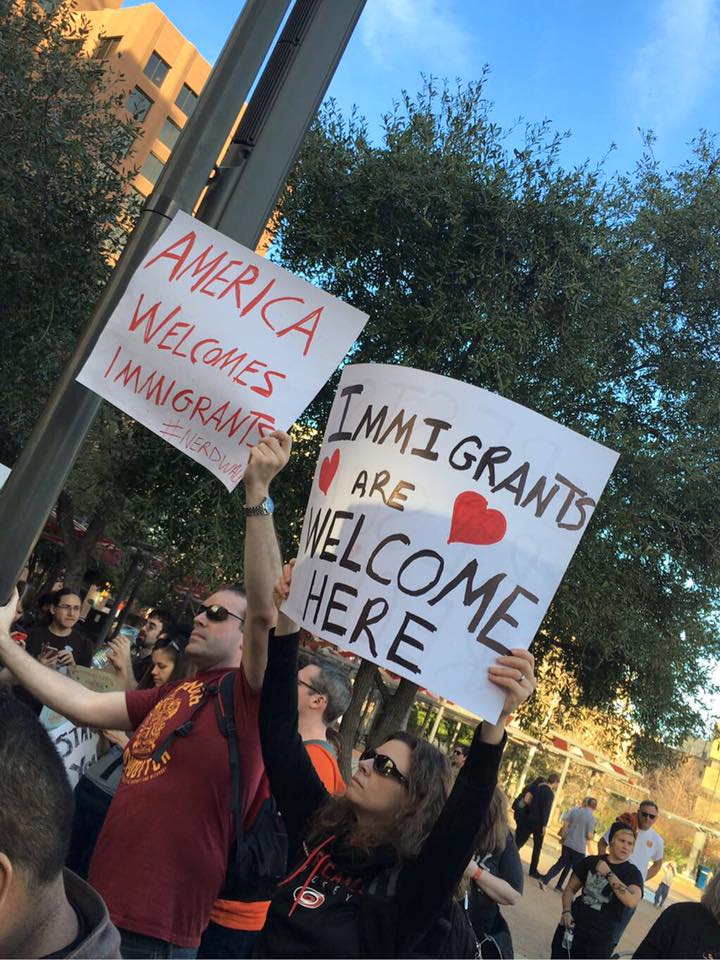The Trinity community responds to Trump’s controversial decision to bar the entry of some foreigners into the states
Amidst rising concerns and worries from the community, Trinity students and staff have found ways to reach out to the concerned community and raise awareness to assist others. On Sunday, Jan. 29th, an estimated 250 people came together at the San Fernando Chapel in the main plaza of downtown San Antonio to protest against the Muslim ban executive order.
The event had been organized by members of the group MOVE San Antonio, which is a non-profit dedicated to promoting the involvement of young adults in policy-making processes.
“We organized it in less than 24 hours. I had gotten some text messages from students that were affected or felt personally alienated by the Muslim ban, so I suggested in the group that we find a way to reach out to them somehow, and from there that kind of blossomed into the idea of the rally,” said Chiara Pride, a first-year political science and anthropology double major and member of MOVE San Antonio.
Pride found the various responses of the supporters and attendees to their event overwhelmingly positive and exciting.
“It was pretty remarkable because we posted the Facebook event for the protest at around 8 the day before and only a couple of people were interested. By the morning of the protest, 500 people were interested in attending, and hundreds did attend.” Pride said.
Some people in the crowd may have been familiar faces, as Trinity students who wanted to stand up against the travel ban attended the protest event.
“Someone I knew shared the Facebook event, so I reached out to a couple of my friends and the four of us ended up carpooling,” said Will Farnell, a junior physics major.
Farnell personally felt that the recent actions of President Trump conflicted with values he believed in, which motivated him to attend the event.
“That’s not who we are as a country and it felt really important for me to stand up and say that,” Farnell said
Pride also cited her desire to assist struggling people outside of the country as her personal reason for attending the event.
“They’re just not getting the support they need right now, so I think we should be that support for them,” Pride said.
Some students on campus feel directly targeted as a result of the executive order, such as Yara Samman, a junior biology major. Samman is a green card holder and worries about her ability to travel as a consequence of the ban.
“The federal judge did repeal that decision for green card holders since they are legal residents, so I can leave and come back, but I know I’m still not going to do that now that I know that something like this might happen again.” Samman said.
Simran Jeet Singh, a professor of religion, also observed how many students in and outside of his classroom were affected by the ban. Singh has since been vocal about his desire to help those affected.
“Either the students are personally affected, or their families are abroad at one of these several countries. I’ve heard from a number of students who have had to change their travel plans because they don’t know if they would be let back in once they leave,” Singh said.
He has also felt the impact of the ban within his own classroom during discussions.
“We’ve been talking about these issues in my classes a lot lately, and I think that it’s changed my class structure quite a bit. You can’t teach Islam today without talking about this stuff,” Singh said.
The Trinity community has also found ways to extend their support directly from campus. During Nacho Hour on Feb. 1st, students wrote notes of support on index cards that will be delivered to local mosques; Singh was responsible for organizing the event.
“I just thought it would be powerful to think of something actionable, something that people could do to be positive during this time,” said Singh.
Some students have found other ways to get connected to current events and stay involved in rising issues. Samman is the co-founder of the International Humanitarian Crisis Initiative, which raises money for refugees, and Farner is a member of the LGBT organization on campus, PRIDE.
“I think that it really helps to find one cause that you’re really passionate about. Find one thing to focus on so that you don’t feel overwhelmed by the amount of organizations and opportunities that are out there,” Pride said.
Regardless of what you choose to support, it’s important to remember that at the end of the day, we are all members of one unique community, and our actions can have great impacts on the opportunities available to others.
“What I’d really like for Trinity students to think about is how they can guard themselves from falling into the trap of dehumanizing other people. There are different ways to do that, but it takes conscious effort to not fall into that trap, so I’m very hopeful that people are thoughtful and aware of that,” Singh said.







